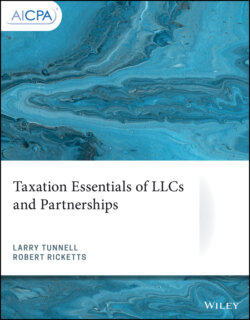Читать книгу Taxation Essentials of LLCs and Partnerships - Larry Tunnell - Страница 41
Example 1-21
ОглавлениеA, B, and C are members of an LLC that has elected to be taxed as a partnership for federal income tax purposes. The LLC is not a service partnership as defined in the proposed regulations under Section 1402. A and B each own one unit in the LLC; C owns two units. Therefore, A and B are each entitled to share in 25% of the company's profits and losses, but C receives 50%. In addition, B and C perform services on behalf of the LLC. B worked 600 hours in the current year, but C worked 1,000 hours. C, as the managing “partner” of the LLC, has the authority under state law to contract on the LLC's behalf. B and C each received guaranteed payments from the LLC as compensation for services rendered. None of the members has personal liability for entity debts or claims against the entity.
The proposed regulations provide that A, who is not authorized to contract on behalf of the LLC, does not provide services to or on behalf of the LLC, and has no personal responsibility for LLC debts, will be treated as a limited partner. Therefore, his or her distributive share of LLC ordinary income will be excluded from his or her net earnings from self-employment.
Likewise, B will also be classified as a limited partner. Although B performed more than 500 hours of service for the LLC, he or she is not authorized to contract on the LLC's behalf and is not personally liable for LLC debts. Moreover, his or her rights and obligations as a member of the LLC are identical to A's. Because A's interest in the LLC is substantial, and A is treated as a limited partner, B will also be treated as a limited partner. His or her distributive share of LLC income will not be subject to SE tax, although the amounts received as guaranteed payments for services rendered to the LLC will be subject to SE tax.
Unlike A and B, C will not be treated as a limited partner, because he or she has the authority to contract on behalf of the LLC. Accordingly, both his or her distributive share of LLC ordinary income and any amounts received as guaranteed payments for services rendered to the LLC will be classified as earned income.18
These rules appear to be consistent with proposed regulations under IRC Section 469 issued in November 2012. Proposed Reg. Sec. 1.469-5(e)(3)(i) change the rules for determining whether an LLC member should be treated as a limited partner for purposes of the passive loss limitations. Unlike the existing regulations under IRC Section 469, which base the determination of limited partnership status on the issue of whether the partner or LLC member enjoys limited liability for the entity's activities, the proposed regulations base this determination instead on the LLC member's right to “manage” the entity.19 Presumably, an LLC member should be classified consistently regardless of the statute under which his or her status is being evaluated. Therefore, a member of an LLC who does not have the right to participate in management is properly classified as a limited partner whose allocable share of LLC losses will be subject to the passive loss limitations of IRC Section 469, but whose allocable share of profits will not be subject to self-employment taxes. In contrast, if the member does have the right to participate in management (whether or not exercised), his or her allocable share of LLC losses will not be subject to the passive loss limitations and any allocable share of LLC profits will be subject to SE taxes.
